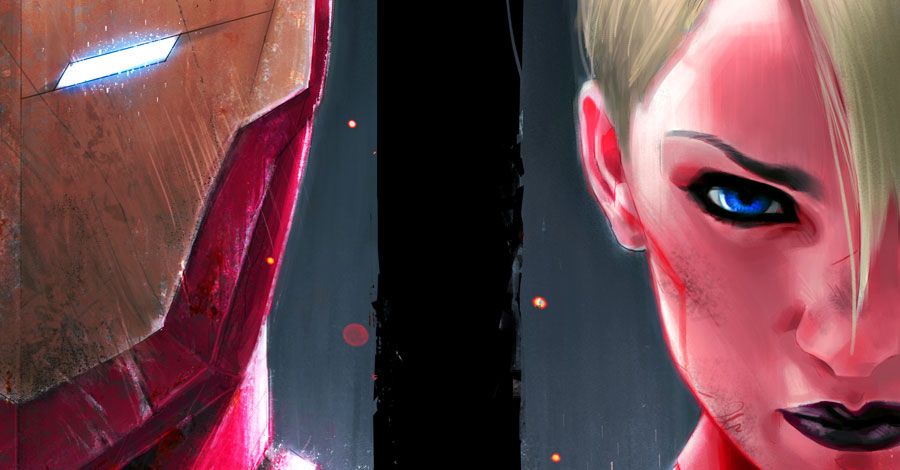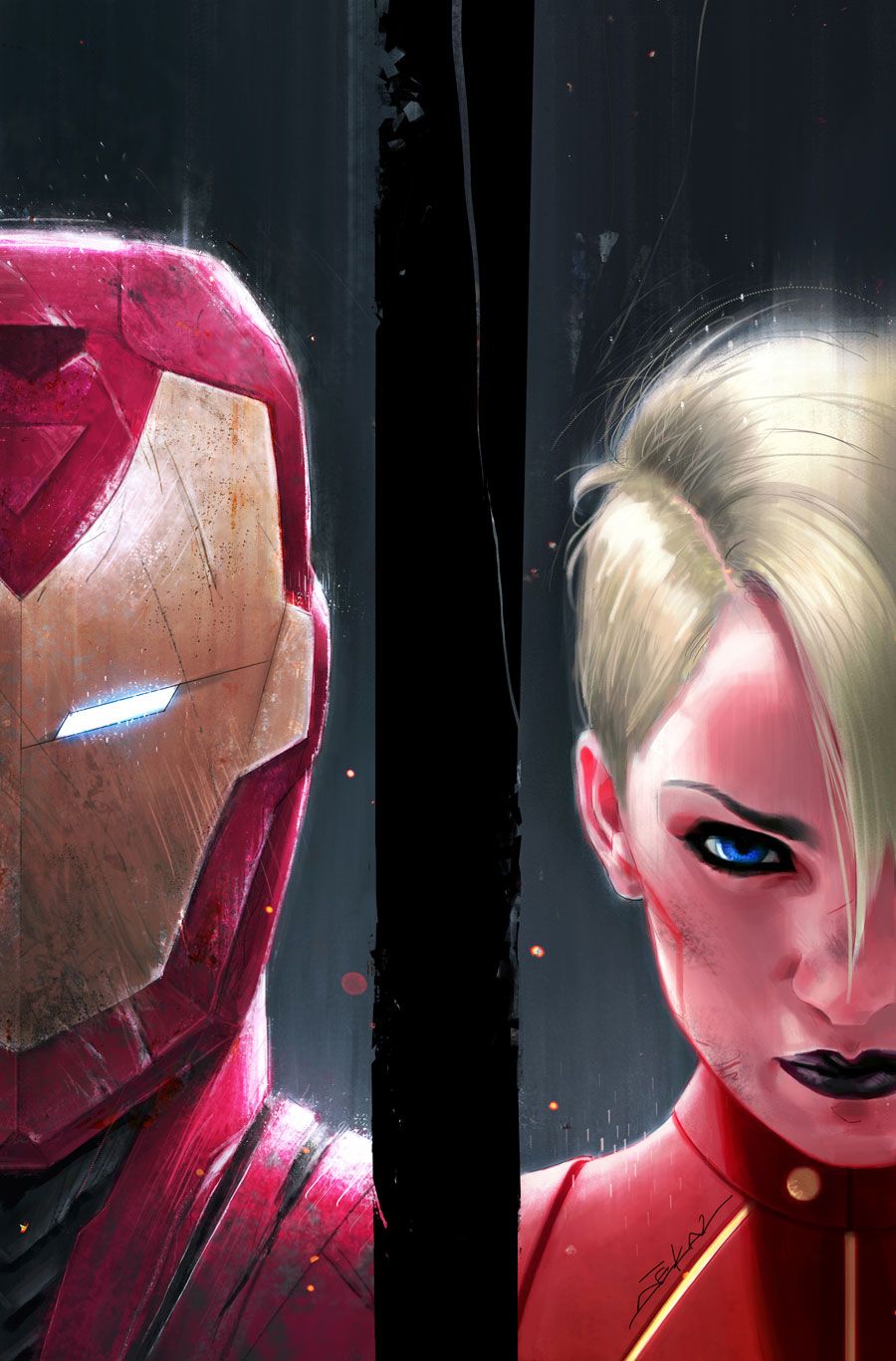For over 75 years, Steve Rogers stood as perhaps the most inspiring and honest man in the Marvel Universe. The original Captain America's good name and the example he set have inspired countless men and women to keep fighting against impossible odds, and placed him in the position to effect major change in the Marvel Universe. Soon, however, its that stature that will place the entire the world in grave danger.
RELATED: "Captain America: Steve Rogers" Kneels Before the Red Skull in New Preview
Recently, the reality-warping child known as Kobik used her abilities to rewrite history. Reaching into the past and molding it like so much clay, she transformed Rogers into a loyal and utterly ruthless deep cover agent for the terrorist group known as Hydra.
This fall, Rogers will use his carefully constructed and impeccable reputation to get himself in a position where he can cause incredible havoc, secretly advancing the agenda of his master, the Red Skull: at the peace table where the feuding generals of the current superhero Civil War will look to resolve their differences.
RELATED: INTERVIEW: Spencer Declassifies "Captain America: Steve Rogers'" Hydra Secrets, Cosmic Connections
This all goes down in the October epilogue style one-shot, "Civil War II: The Oath" by writer Nick Spencer and artist Rod Reis. CBR News spoke exclusively with Spencer about his inspiration for the story, the damaging power of Steve Rogers' cover identity, and the major impact it will have on the entire Marvel Universe.
CBR News: How does it feel to write the epilogue to a big event like "Civil War II?" And how important is "The Oath" to the larger story you're telling in your Captain America books, and to the Marvel Universe as a whole?
Nick Spencer: I'll tackle the first part of your question first.
When "Civil War II" was on the table, and we started discussing it at the retreats, I had a very early talk with Tom Brevoort about how I was desperate to write the epilogue. I was a huge fan of what Brian Bendis had done with "The Confession." [The epilogue one-shot to the first "Civil War."] It was one of my favorite event comics ever. I really wanted to have my name on something that at least aspired to do the same type of thing.
I made it known very early on that I was keen to do something like that, and thankfully, everything lined up. Because, moving to the second part of your question, we keep promising that these two big stories that we're telling, "Civil War II" and the whole hail Hydra story, are going to interconnect and dovetail. But not only that, they're going to have a really significant impact on each other's stories. These storylines are very much on a collision course, and one of the biggest places you'll see that reflected -- it won't be the only one, or the first one, though -- is in "The Oath."
"The Oath" is the Marvel debut of an artist who's done a lot of work for DC Comics and some for Image -- Rod Reis.
Yes, Rod was a special request from me. He was the first person I asked for. I became a huge fan of his work on "C.O.W.L." with Kyle Higgins. That's a great Image book, and I'm a huge fan of his art.
This assignment in particular required a very specific approach, and an artist capable of giving it the atmosphere that we needed, the character moments we needed. I'm so excited for Marvel audiences who may not know his work to see this. They're going to be floored. He's an absolutely phenomenal artist, and I'm very excited to be working with him on this.
Is "The Oath" a launching point for some of the books we saw in the recent Marvel NOW! Teasers?
Yes. What I would say about that is, while everybody gets that the Hydra story we're doing right now is very big and very high profile, I still don't think that most of the audience quite grasps how big it's going to get. I think by the time "The Oath" ends, you'll have a much stronger sense of what you're looking at. A lot of folks will realize the magnitude of what we've done here for the first time. It will definitely have a transformative effect on the Marvel Universe coming out of "Civil War II." That's definitely not an overstatement. It will have very severe, very drastic repercussions for where the entire line goes, moving forward.
At the center of "The Oath" are Carol Danvers, Tony Stark and Steve Rogers. What's it like writing these characters together, especially in light of all they go through in "Civil War II" and what's happened to Steve?
I have to be careful about what I say here, because, obviously, we're only at the midway point of "Civil War II." What I believe I can say, based on what you've seen so far is, we're looking very much at a Marvel Universe that's divided and is very much at a low point. These are, really, our heroes in their darkest hours. For Steve, given his current alignment and his current situation, this represents a great opportunity, and he's going to seize the moment in a major way.
As a Hydra agent, it seems Steve's most valuable asset is his cover, how the Marvel Universe views him, because it allows him the chance to seize moments like this.
Absolutely. What we've been saying about the story, and again, is the stuff we haven't had a chance to explore very much yet but will come into focus as we get nearer to this is, this is a story about the most trusted most revered figure in the Marvel Universe secretly being Hydra and very much not a force for good.
When everybody is at their lowest, most destitute point, the easiest thing to do is give the keys to the person that they trust the most. The easiest thing for them to do is to look for an honest broker. That is a faith and a trust that will be definitely exploited.
Does that mean that anyone that comes close to exposing Steve's cover is in imminent danger from him?
A huge part of the fun of the story is waiting to see if people find out the secret, how they find out the secret, and when they find it out. Is it too late? Is it too late for them?
Steve has already shown that he's willing to take that drastic step when he's in danger of being exposed, so any time a hero is getting close to Steve, and anytime they're shown with Steve, you need to worry about that. That is very much something you need to think about in every moment that you see Steve in every book. I really think when this one hits, people will finally start to understand what that means.
With Steve, they're not just dealing with a character that can inspire people, they're dealing with a character that's very calculating and Machiavellian.
Absolutely. He understands what his situation is. He understands the power that he wields. He's absolutely going to make use of it and bend things to suit him.
Can you talk any more about how "The Oath" unfolds, or the significance of the title?
The title is very much tied to some fundamental changes that are going to happen among certain heroes in the Marvel Universe, the new positions they're going to be placed in, and the new struggles they'll be facing. It's a very serious moment. It's a very somber moment, and it's going to lead to some pretty serious things moving forward.
To go back to your earlier mention of "The Confession," that was very much an emotionally powerful story. Is that what you're aiming for with "The Oath?"
Absolutely. I think this story deals a little bit more with event ramifications, fallout, and sets the stage for what comes next, but at its core, it's still very much an exploration of these three characters: Steve, Carol and Tony. A lot of it is very intimate and very character driven. I wanted to get into their heads as much as possible and show you what's going on in their lives.


